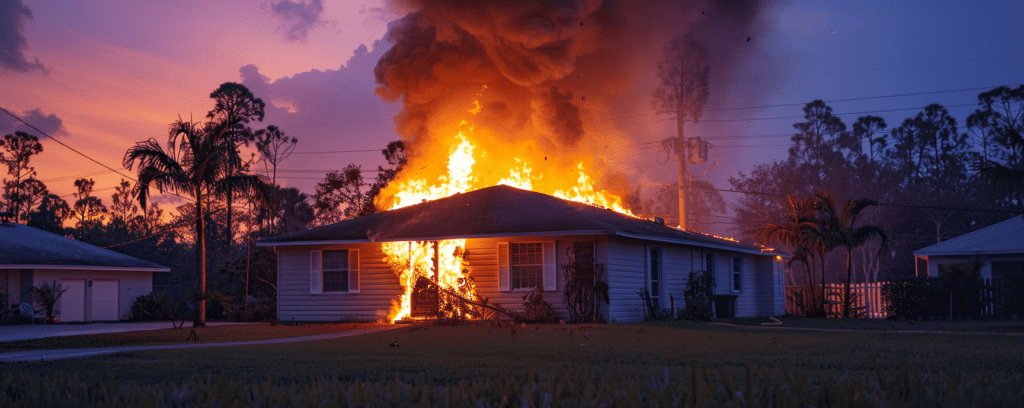
Unexpected and destructive, house explosions are often caused by gas leaks, defective appliances, and human oversights. This article provides an in-depth look at “why do houses explode”, highlights the warning signals of imminent danger, and offers practical steps to prevent such catastrophes in your living space.
Key Takeaways
- House explosions usually have identifiable causes, including natural gas leaks, faulty appliances, and human error; maintenance and vigilance are key to prevention.
- Explosions can have devastating consequences, inflicting severe injuries or fatalities, extensive property damage, and causing significant emotional and financial distress for victims.
- Preventative measures such as recognizing warning signs (like smell of gas, hissing sounds, and dead vegetation), regular maintenance, and installing gas detectors are crucial in preventing house explosions.
Contact us today for your free & confidential case review. Our team will help you get the compensation that you deserve.
Common Causes of House Explosions
House explosions can seem like a sudden, unpredictable disaster. However, they typically have identifiable causes, with natural gas explosions, faulty appliances, and human error being the most common culprits. Gas leaks can develop due to wear and tear, corrosion, or damage to pipelines or appliances, leading to potential explosive mixtures with air if ignition sources are present.
Faulty gas appliances such as stoves, water heaters, and furnaces are significant contributors to house explosions when they malfunction. Gas explosions are characterized by a rapid release of energy and a detonation resulting from flammable gases igniting, presenting a sudden and violent threat to life and property.
Gas Leaks
Gas leaks are a serious concern as they can lead to devastating house explosions. Natural gas and other gases like methane, propane, and butane can cause explosions when leaking into confined spaces such as homes or businesses. These leaks can come from pipelines, appliances, or damaged gas lines, making it essential to maintain these systems properly and ensure their integrity.
The danger lies in the fact that these gases, including carbon monoxide, can easily mix with air to form an explosive atmosphere. The presence of an ignition source, such as a spark or a flame, can trigger an explosion, causing catastrophic damage. Therefore, it’s crucial to recognize the signs of a gas leak and take immediate action.
Faulty Appliances
Faulty gas appliances pose serious dangers. When appliances like stoves, water heaters, and space heaters malfunction, they can contribute significantly to house explosions. These appliances, if not properly maintained or repaired, can leak gas, posing a risk of severe burns, injuries, fatalities, and substantial property damage.
Water damage to the gas controls of an appliance can damage internal safety mechanisms, necessitating immediate replacement by trained professionals to prevent accidents. Therefore, it’s crucial to regularly inspect these appliances and ensure they’re in good working condition.
Human Error
Human error also plays a significant role in house explosions. Improper installation of gas appliances and systems can lead to dangerous situations causing house explosions. Moreover, poor maintenance of gas systems can result in malfunctions that escalate into explosive incidents.
Tampering with gas systems without proper authorization can disrupt the gas flow and safety mechanisms, increasing the risk of house explosions. Training and education on the safe handling of gas systems are thus vital to prevent such dangerous situations.
The Dangers and Consequences of House Explosions

- Severe injuries
- Burns
- Fatalities
- Property damage
House explosions can lead to life-altering experiences for those involved, including:
- Severe injuries to first responders like firefighters, putting human lives at risk
- Dealing with physical injuries
- Dealing with the emotional trauma of losing a home or a loved one.
Injuries and Fatalities
The physical impact of a house explosion can range from minor injuries to fatalities. Depending on the severity of the explosion, injuries can vary from minor cuts and bruises to severe burns and asphyxiation. In extreme cases, house explosions can even lead to death.
Indeed, gas explosions pose a lethal risk to anyone in the vicinity. For instance, gas grills are responsible for around 6,000 explosions each year, which can result in serious injuries or fatalities. Understanding these risks underscores the importance of precautionary measures when dealing with gas appliances.
Property Damage
The force of a gas explosion can cause significant property damage. It can lead to the structural collapse and extensive destruction of the house framework. Household products that are combustible, such as stored chemicals or cooking flour dust, create additional risks of ignition and can exacerbate property damage when exposed to heat sources or flames.
Beyond the structural damage, the contents inside a home, including personal belongings, can be destroyed as a result of the immense force and ensuing fire caused by a house explosion. This loss can be devastating, adding to the emotional trauma experienced by the victims.
Emotional and Financial Impact
Beyond the physical injuries and property damage, house explosions can lead to significant emotional distress for victims and their families, including trauma, anxiety, and grief. The sudden loss of one’s home and possessions can be a harrowing experience, leading to emotional turmoil that can persist long after the incident.
Additionally, the financial impact of a house explosion can be overwhelming. The costs of property loss, medical bills, and potential loss of income can place a significant strain on victims. Often, victims face a combined emotional and financial crisis that can affect their well-being and ability to recover post-incident.
Recognizing Signs of Potential Gas Hazards
Preventing house explosions significantly depends on the ability to recognize potential gas hazards. Homeowners can prevent house explosions by being vigilant for signs of potential gas hazards. Early detection of these signs can help in taking swift action to prevent a disaster.
The smell of gas, hissing sounds near gas appliances or pipelines, and dead vegetation around gas lines are key indicators of gas leaks. Recognizing these signs and acting promptly by contacting your gas company can save lives and prevent property damage caused by gas leakage.
Smell of Gas
The smell of gas is one of the most noticeable signs of a potential gas leak. Natural gas in its pure form is odorless and colorless, but gas companies add odorants that smell like sulfur or rotten eggs to help detect leaks. This odor, often likened to the smell of rotten eggs, is the first line of defense in detecting gas in a house. If you smell gas, it’s crucial to take immediate action to ensure your safety.
Therefore, it’s crucial to educate all household members, including children, on recognizing the smell of gas, symptoms of exposure, and the appropriate actions to take if they suspect a gas leak. The smell of gas should never be ignored and should prompt immediate action.
Hissing Sounds
Hissing sounds near gas appliances or pipelines can signal a gas leak. Large gas leaks may produce hissing sounds, indicating potential gas leaks. These noises can be heard near pipes or appliances even when they are turned off.
As such, it’s important to regularly inspect gas pipes and appliances for hissing sounds as a method for detecting potential gas leaks. Any unusual sound coming from your gas appliances or pipelines should be investigated immediately.
Dead Vegetation
Unexplained dead or stunted vegetation around gas lines can indicate a gas leak. If you notice that your plants are dying or struggling to grow, even when they are well-cared for, it could be a sign of a natural gas leak in the gas line.
Any changes in the vegetation around your property should be taken seriously. If you observe this sign, it’s crucial to contact professionals to conduct an inspection and repair any leaks.
Contact us today for your free & confidential case review. Our team will help you get the compensation that you deserve.
Preventative Measures for House Explosions
Preventing house explosions involves a combination of vigilance, regular maintenance, and the installation of safety devices. Recognizing the smell of gas is crucial for homeowners as an immediate sign of a potential gas leak and can help prevent house explosions.
However, beyond early detection, regular professional servicing of gas appliances is a vital preventative measure to reduce the risk of explosions due to malfunction or leaks. Let’s delve deeper into these preventative measures.
Regular Maintenance
Regular professional servicing of gas appliances can help prevent malfunctions and leaks that may lead to explosions. Annual servicing by trained professionals can prevent explosions by ensuring water heater tanks are not over-pressurized and by assessing the condition of gas pipes and appliances for necessary replacements.
Routine maintenance inspections can also help prevent gas grill explosions and detect possible hazards due to human error. Regular inspection of appliances and their connectors can prevent hazards such as leaks in natural gas systems and can identify issues like excessive movement, bending, or corrosion.
Installation of Gas Detectors
Installing gas detectors in homes can provide an early warning of gas leaks and help prevent house explosions. Gas leak detectors serve as an essential early warning system against leaks, potentially averting fires or explosions.
Various gas detectors are designed to sense different gases and should be installed in areas prone to gas accumulation, such as kitchens and boiler rooms. To ensure safety, proper placement of natural gas detectors is essential, including locations where gas would likely collect and where alarms are audibly clear to occupants.
Regular maintenance and professional checks of gas detection equipment are also recommended to ensure their correct function and reliability.
Safe Practices
Safe practices to reduce the risk of house explosions include implementing safety measures such as:
- Turning off gas appliances when not in use
- Proper installation of gas appliances
- Turning off gas fireplaces and space heaters before going to bed or leaving home, as leaving them operating unattended can pose safety risks.
Gas appliance installation and repair should be carried out by a trained technician to ensure they are set up safely and function properly. In addition, educating all household members on the location and operation of the natural gas shutoff valve is a preventative measure to stop gas flow in the event of a leak.
Steps to Take in Case of a Gas Leak or Explosion
In case of a gas leak or explosion, it’s crucial to know what steps to take. If a gas smell is detected, it’s essential to leave the house immediately without turning on lights or using any appliances, get to a safe distance, and then call the emergency line.
In the event of a gas explosion, follow these steps:
- Immediately implement evacuation procedures and ensure everyone leaves the area.
- If it is safe to do so, shut off the gas supply.
- Promptly initiate an emergency response and first aid measures, including calling medical personnel and utility companies.
- Avoid re-entering the house after shutting off the gas supply.
- Immediately call 911 for professional emergency services.
Legal Support for Victims of House Explosions
Victims of house explosions often face a complex legal process to seek compensation for their injuries and property damage. Experienced attorneys are essential in guiding these victims through the process. Many victims of explosions may not be initially aware of their legal options, and consultation with an attorney can help protect their rights.
Law firms like Mausner Graham Injury Law Firm specialize in establishing liability and demonstrating fault in explosion cases, whether due to negligence by gas companies, construction firms, property owners, or product manufacturers. Attorneys play a critical role in negotiating settlements and can also represent clients in court to ensure they receive fair compensation for damages resulting from the explosion.
Frequently Asked Questions
What are the common causes of house explosions?
Gas leaks, faulty appliances, and human error are the common causes of house explosions. Always ensure proper maintenance and care to prevent such accidents.
What are the signs of a potential gas leak?
If you notice the smell of gas, hissing sounds near gas appliances or pipelines, or dead vegetation around gas lines, it could be a sign of a potential gas leak. Take immediate action and contact a professional for assistance.
What preventive measures can I take to avoid house explosions?
To prevent house explosions, you should regularly service gas appliances, install gas detectors in your home, and follow safe habits around gas appliances. These measures can help ensure your safety and the safety of your household members.
What should I do in case of a gas leak or explosion?
In case of a gas leak or explosion, evacuate the area, turn off the gas supply if it’s safe, and call emergency services for immediate assistance.
Can I seek legal help if I'm a victim of a house explosion?
Yes, you can seek legal help as a victim of a house explosion to navigate the complex process of seeking compensation for injuries and property damage.
Last updated Monday, June 3rd, 2024










